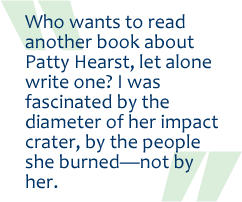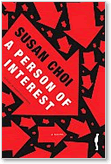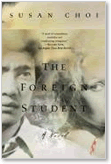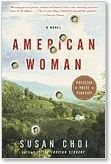Susan Choi
posted Sep 23, 2008
If the plot of Susan Choi’s latest book, A Person of Interest, sounds a bit familiar, that’s because it echoes the notorious Unabomber case as well as the saga of Wen Ho Lee, the Asian-American scientist accused by U.S. authorities of spying for China. In this book and in her last, Choi takes a different twist on stories we've heard about in the news, exploring with depth and empathy the characters who lived in the shadows of highly publicized events. Choi’s Professor Lee is an Asian-born scientist who is investigated by the FBI after a popular colleague is murdered by a serial bomber. Readers will feel sympathetic, albeit suspicious of Lee, whose alienation and loneliness make him an even more dubious character, vilified by neighbors, coworkers, and the media.
But what, pray tell, does all of this have to do with the genius of Russian and Jewish-American literature? Our intrepid associate fiction editor, Julie Newberger, set out to answer this question, and a good many more, and what follows is what she found, by way of a record of her virtual sit-down with Choi.
| * * |
You’ve said that you labored over your first two books, learning to create characters and write a story—yet you were excited every time you sat down to write A Person of Interest. Why was this? Have you learned something in writing this book that will make it easier for you to write your next?
God, I hope so. Writing this book was a new experience for me because I had momentum really early on. With my first two books I struggled for that constantly, and things constantly went slack, and I would double back or switch time frames or whatever—I’d do all sorts of things to escape from stagnation. By contrast this story overtook me; I felt as if I was racing to keep up, and I was constantly being surprised by it, which is such a pleasure. But have I learned anything? I certainly have no idea why things worked the way they did, or how I can reproduce the experience, so I may have learned nothing.
Some critics have claimed that the ending—in which you switch focus to characters other than Lee—wasn’t the strongest part of the book. You’ve mentioned that the ending of A Person of Interest changed radically from where you initially thought it would go. How do you respond to that? Why did you change the direction and are you still satisfied that you did?
They’re fools! No, I’m kidding, but in my defense a lot of people have said the opposite, that the ending is their favorite part of the book. I guess it was risky to shift to another character’s perspective when I did, but I had to—it was a gut urge, like the urge to break down a door when you’re feeling claustrophobic. I think it was the right decision. The reader needs some escape from Lee, and needs to see Lee from the distance that Mark’s perspective provides. An interviewer said something brilliant to me about this: that just when Mark discovers that everything he’s ever been familiar with, everything he’s ever believed about himself, is false—that he doesn’t even know who he is—the reader is subjected to the same experience. Everything the reader has come to be familiar with about the book—Lee’s consciousness, Lee’s perspective—is swept away in a stroke. The reader has to start fresh, like Mark, and has to start fresh with Mark. I loved that idea.
Lee, the protagonist of A Person of Interest, is a career academic, like your father. You tried the academic life for a while, then dropped out of a doctoral program at 24. Was your experience in academia different that of your father’s? How does your experience in the world of academia play out in your fiction?
My experience was entirely different in that I had no idea what field I wanted to specialize in, and so obviously no passion for any of the academic fields I was considering. My father is passionate about his work, and therefore very lucky. He loves mathematics, and he loves his particular field within mathematics; the beauty and the mystery of his field are never exhausted for him. He’s very fulfilled—that’s one of many ways in which he differs from this character, and from me when I was in graduate school. I had a top-down reason for being there: I thought it was a good idea that I become a professor of something because I had no idea what else to do, so I went to grad school and cast about for a specialization. It should be bottom-up; you should be impassioned about the field in the first place, as my father is, and then you go to grad school because it gives you the opportunity to make that field your profession.
You are sometimes referred to as an Asian-American writer, and your three published novels feature Asian-American protagonists. While your father is an Asian immigrant, your mother is Russian and Jewish. It doesn’t seem that you’ve explored your Russian-Jewish heritage as thoroughly in your fiction. Why do you think that is? Do you plan to do so in the future?
I am very slightly, who knows why, intimidated by some of those Jewish American writers who have already spilled ink on the subject—not to mention the Russians! But never say never. Don’t count me out yet.
When Professor Lee becomes a person of interest to the FBI in a Unabomber-type case, his own loneliness and alienation drive him to antisocial behavior that makes the public and the press even more suspicious. How does Lee’s ethnicity and identity as an immigrant play into this?
I think both factors make onlookers far less likely to cut him slack, far more likely to put the worst possible design on his actions— he’s given no benefit of the doubt. Do I think he might have fared differently—pretending for a moment he’s an actual person—if he’d been a white man? I do. If he’d been a white woman? His experience would have been different again.
Throughout much of the novel, Lee is convinced that he knows the identity of the serial bomber, even when presented with FBI evidence that his theory is incorrect. Why is the astute and intelligent Lee unable to consider that he might be wrong or explore alternative theories?
Lee is astute and intelligent, but his overpowering emotions make for terrible distortions in his perception of those things about which he’s emotional—this is true of us all. His personal burden of guilt, as well as his knowledge of another man’s dislike of him, together make him almost hysterical. Under those circumstances, it’s easy to misperceive things.
Why did you choose not to give the reader Professor Lee’s first name?
I’d decided I didn’t want to be specific about Lee’s ethnicity, and so I needed something generic for his name that didn’t paint me into a corner. Lee did the trick for a last name, but then I couldn’t hit on an equally generic first name. And after a while I liked the sound of his just being “Lee.” Besides, Graham Greene does it. If it’s good enough for Graham Greene it’s good enough for me.

The plots of your last two books echo real-life crimes that reached celebrity status (i.e., the Patty Hearst kidnapping and the Unabomber case, respectively). In both novels, you resisted using the celebrity/criminals as the protagonists, and instead focused on supporting players—the professor in the office next door to the bombing victim, and the Japanese American fugitive involved in the group kidnapping of Patty Hearst. Why did you choose to focus on these supporting characters?
Because they’re so much more interesting. Who wants to read another book about Patty Hearst, let alone write one? I was fascinated by the diameter of her impact crater, by the people she burned—not by her. The same with Kacsynski. And you’ll see that with these two in particular, there’s a strange stubborn opacity to them both—you read their declarations about themselves and you really don’t want to go further. The people who most easily monopolize popular attention, like for example Britney Spears—for some reason they’re often just stultifying. But the people being dragged along in their wake, the people whose lives they’ve destroyed—they can be riveting.
You’ve been praised for your ability to create suspense as a writer, along with your complex characters and artful language. Is this ability to withhold just enough information to pull the reader from page to page purely an instinct, or do you model your work after writers who achieve this suspense so successfully? Which writers do you admire for achieving this?
Really? Have I really been praised for that? I keep seeing reviews that grouse that this book doesn’t work as a thriller, and I’m like, It wasn’t supposed to be a thriller! Who on earth said that it was a thriller? But your question reminds me of when I was revising my first book, and my boyfriend at the time said, basically, “Why are you keeping this information”—one of the characters, the love interest of the main character, was engaged to be married to somebody else—“a secret from the reader? What’s the point of that? The book keeps intimating that something’s up but not saying what it is, and that’s not just confusing but annoying. Better to let the reader know—then the reader knows something the main character doesn’t. That’s suspenseful.” And boy, was he right! (I should add that I married this boyfriend, in part because he’s so smart and has such good editorial judgment.) So I certainly haven’t always been good at the hard work of figuring out when to tell the reader what, and how much.
In American Woman, your second novel, you set out to work on aspects of form that you hadn’t concentrated on in The Foreign Student. Did you work on new aspects of form in A Person of Interest? What did you try to achieve in your latest book that you had not achieved before?
I desperately wanted to write a book that was very tightly plotted, that moved forward in time, that took place largely in the present tense—that wasn’t, in other words, structurally elliptical and gauzy and drifting from one period to another. I didn’t fully succeed; much of APOI takes place in the past. But I do feel, at least, that the present-day plot is well-built and that it unfolds in a compelling and satisfying way.
What are you working on now, and can you give us a preview of your upcoming projects?
For the time being I am floundering around. I guess you could say, to make it sound better, that I’m floundering around in a primordial soup of ideas. A wonderfully nutritious primordial soup of ideas.
© 2008 failbetter LLC · all rights reserved










